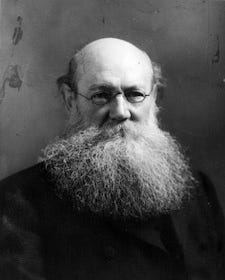What Does Objectivism Have to Do With Wikipedia?
Writer Evgeny Morozov has a long essay about Wikipedia, organized as a review of Andrew Lih's "The Wikipedia Revolution", in the latest issue of Boston Review. Morozov identifies his chosen takeaway in a post on his blog, but I'm interested in what he has to say, via Lih's book, about how Wikipedia's co-founders first met through their shared regard for the philosophy of Ayn Rand:
Two of Wikipedia’s co-founders found each other on philosophy-related mailing lists. Indeed Sanger has a philosophy PhD (his Ohio State doctoral thesis is titled “Epistemic Circularity: An Essay on the Problem of Meta-Justification”), while Wales almost completed a PhD in finance. They came to the project with assumptions about human cooperation that appear to be rooted in philosophy, economics, and evolutionary psychology (among other disciplines), but those ideas are poorly articulated in the book.
Lih does point out that Sanger and Wales were heavily influenced by Ayn Rand’s Objectivism (shades of Alan Greenspan), according to which, reality exists independent of consciousness and life’s great purpose is the rational pursuit of self-interest. Wales’s fascination with Rand was so deep that he even named his daughter after a protagonist in one of Rand’s books. But Lih does not explain the steps from Objectivism to an encyclopedia that “could detail what is true in the world without judgments.” After all, didn’t the Encyclopedia Britannica (or Diderot’s Encyclopédie, for that matter) aim to check judgments at the door and detail only “what is true in the world”? And isn’t that the aim of the new computational search engine, WolframAlpha? How does Objectivism enter the picture?
Maybe it doesn’t.
I've puzzled over this fact, as well. One of the core tenets of Objectivism is that altruism is no virtue. From Wikipedia's Objectivism (Ayn Rand) entry:
A corollary to Rand's endorsement of self-interest is her rejection of the ethical doctrine of altruism—which she defined in the sense of Auguste Comte's altruism (he coined the term), as a moral obligation to live for the sake of others.
Yet Wikipedia's volunteer-driven non-commercial nature seems the very definition of altruism. As an amateur observer of Objectivism and Objectivists -- I ran a libertarian-leaning magazine in college -- my best reconciliation is that so long as one's motives for editing (or creating) Wikipedia are defined in terms of one's own self-interest then there is no contradiction. If one derives personal value from research and writing for its own sake, or from esteem among one's peers (fellow Wikipedians) then it makes perfect sense. In that case, production of an online encyclopedia useful to the world is a happy byproduct. However, If Wales or Sanger have discussed Wikipedia vis-à-vis Rand, it would be news to me.
So if the question is, how does Objectivism enter the picture, I presume that it doesn't necessarily explain anything and that it's entirely possible Wales and Sanger could have met on a listserv for almost any intellectual pursuit.
But Morozov is not done with Rand yet; his criticism of Lih's book is that it raises a few theories about what motivates Wikipedians without arriving at a conclusion. Since Lih's book is primarily a lay history of Wikipedia it doesn't seem fair to me that Lih should have had a unified theory ahead of writing the book, though he did devote space to the subject. Morozov asks:
Lih relies on the work of Harvard law professor Yochai Benkler to address the puzzle. Benkler’s studies of “peer production” draw on the thought of Russian anarchist Piotr Kropotkin, who believed that cooperation is as important in the evolution of species as competition and that “mutual aid” is essential to human survival. Lih does not mention that Rand and Kropotkin are not exactly intellectual soulmates. Lih also does not explain how these two diverging philosophies—one prizing egoism, the other altruism—could live happily together in one site.
Morozov has been doing original research, because while Benkler and Kropotkin both appear in the book, they do not come within 65 pages of each other. Anyway, here is what Lih says about Benkler's proposed explanation for Wikipedian motivations on p. 108:
He asserts that motivation comes from two main things other than money: the "socio-psychological" reward of interacting with others, and the "hedonic" personal gratification of the task.
Which is essentially identical to the rational self-interest described above; just because Randians are strong advocates for a capitalist economy does not mean they love only money. And even if there was a contradiction here, all one must do is look to Wikipedia's pillars to see how the ideas of Rand and Kropotkin may coexist on Wikipedia in NPOV as a principle and policy.
That said, Morozov's essay is otherwise well worth reading, as it delves into worthwhile questions about Wikipedia's structural biases, such as its heavy reliance upon online sources (nearly always found via Google) and resulting quandaries such as determining whether a person from the 1920s may be considered Notable. Questions such as these, rather than the influence of Ayn Rand, are what keep Wikipedians up at night.




